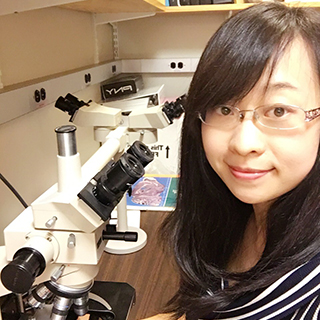I began studying the role of the immune system and inflammation in aging and Alzheimer’s disease (AD) when I joined Dr. Cindy Lemere’s lab at Harvard’s Brigham & Women’s Hospital, six years ago. I am the lead investigator for Dr. Lemere’s project that focuses on the role of complement in synapse loss during aging and AD, utilizing complement C3- and CR3- deficient mice. Throughout my studies, I have observed significant age-related differences in synapses, neurons, microglia, and behavior between male C57BL/6 WT mice vs. C3 knockout (KO) and CR3 KO mice. My studies involve the use of immunohistochemistry, high-resolution confocal microscopy, stereology, electrophysiology, biochemical quantification of synaptic proteins, and behavioral techniques. These long-term studies, examining mice at three different ages, are now coming to fruition and will soon result in several publications, the first of which was recently published by the Journal of Neuroscience as a featured article (Shi et al, J Neurosci, 2015). Further, under Dr. Lemere’s NIH R21 grant, I generated C3 conditional KO (cKO) mice with C3flox/flox mice (generated under our NIH R21 by Dr. Michael Carroll, our collaborator) to investigate the effects of C3 deletion after brain development and in mice that constitutively lack C3 in all myeloid cells. These novel mouse models provide meaningful tools to elucidate the possible mechanisms by which the immune system and complement, in particular, play a role in the brain during aging and/or neurodegenerative diseases. I look forward to characterizing our C3 cKO mice and performing the initial crossbreeding to generate a C3 cKO AD mouse model to begin to investigate the effects of post-development global C3-deletion on synapse dysfunction and AD pathogenesis.
Qiaoqiao Shi, PhD
First published on: August 03, 2016
Last modified on: November 22, 2024
